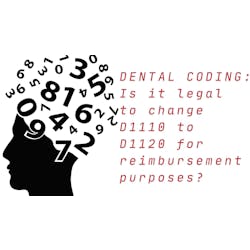When periodontal pathogens invade oral tissues, the immune system activates to counter the invaders. Immune cells, including neutrophils, macrophages, and T cells, are recruited to the infection site. These cells work together to identify, engulf, and eliminate the invading pathogens through phagocytosis and the release of antimicrobial substances.
As part of their defense mechanisms, neutrophils and other immune cells produce reactive oxygen species (ROS), which play a role in microbial killing. Excessive or uncontrolled ROS production can result in oxidative stress, causing damage to cellular components such as lipids, proteins, and DNA. Oxidative stress is a primary factor in tissue damage associated with periodontal diseases.1
Antioxidants play a crucial role in neutralizing free radicals, thereby mitigating oxidative stress. It's prudent to advise periodontal patients to increase their antioxidant intake and incorporate antioxidant-rich foods into their diets. This can help safeguard against oxidative damage and promote better oral and systemic health.
This is where vitamin C comes in
Vitamin C (ascorbic acid) is a crucial nutrient known for its antioxidant properties, neutralizing free radicals while serving as an enzyme cofactor in cells.2,3 Its ability to counteract excessive ROS helps it maintain periodontal health.4 Additionally, vitamin C plays a pivotal role in decelerating periodontal disease advancement by prompting the differentiation of periodontal ligament progenitor cells.5
These cells specialize into various cell types involved in the structure and function of the periodontium, including fibroblasts, osteoblasts (bone-forming cells), and cementoblasts (cementum-forming cells). The maturation of periodontal ligament progenitor cells is essential for maintaining the integrity and function of the periodontal tissues and repairing damage from periodontal disease. Not consuming enough vitamin C can hinder collagen synthesis, leading to weakened connective tissues and delayed wound healing.6
Collagen plays a vital role in structural support and as a scaffold during the development of new tissues. This nutrient is essential to boost collagen synthesis, which assists in the restoration of damaged tissues and wound healing. Periodontal disease is characterized as a chronic wound with a polymicrobial origin. Vitamin C promotes the proliferation and migration of various cell types involved in wound healing, including fibroblasts, which produce collagen, and keratinocytes, which form the outer layer of the skin (epidermis). Vitamin C helps regulate these cellular processes to ensure efficient wound closure and tissue regeneration.
Vitamin C can boost microbial elimination through the enhancement of immune function. It promotes the production and function of white blood cells, including neutrophils, macrophages, and natural killer cells, which are essential for combating microbial infections. In high concentrations it has antimicrobial activity to battle a wide range of pathogens, such as bacteria, viruses, and fungi.
It can disrupt microbial cell membranes, inhibit microbial enzyme activity, and interfere with microbial replication, leading to microbial death. Vitamin C works synergistically to enhance the effectiveness of certain antimicrobial agents when used in combination.7 It can potentiate the antimicrobial activity of antibiotics, antiviral drugs, and other antimicrobial agents, which allows for more efficient microbial killing.8
Oranges often come to mind when we think of vitamin C sources, but other citrus fruits like grapefruits and lemons, as well as cruciferous vegetables, are equally abundant in this nutrient. Opting for whole fruits, which contain fiber, is preferable for glycemic control compared to drinking orange juice. As for vegetables, options like broccoli, kale, brussels sprouts, red cabbage, and cauliflower are packed with vitamin C and other antioxidants. Even a medium-sized potato contains approximately 17 milligrams of vitamin C, fulfilling about 35% of the daily intake. Potatoes are also good sources of potassium and vitamin B6.
In a nutshell, vitamin C can enhance collagen synthesis and stabilization, protect against ROS-induced damage, enhance fibroblast proliferation and migration, and shorten wound healing time. Sharing this information is simply another realm where dental hygienists truly serve as health-care providers.
References
1. Wang Y, Andrukhov O, Rausch-Fan X. Oxidative stress and antioxidant system in periodontitis. Front Physiol. 2017;8(11):910. doi:10.3389/fphys.2017.00910
2. Carr AC, Frei B. Toward a new recommended dietary allowance for vitamin C based on antioxidant and health effects in humans. Am J Clin Nutr. 1999;69(6):1086-1107. doi:10.1093/ajcn/69.6.1086
3. Padayatty SJ, Katz A, Wang Y, et al. Vitamin C as an antioxidant: evaluation of its role in disease prevention. J Am Coll Nutr. 2003;22(1):18-35. doi:10.1080/07315724.2003.10719272
4. Chapple IL, Matthews JB. The role of reactive oxygen and antioxidant species in periodontal tissue destruction. Periodontol 2000. 2007;43:160-232. doi:10.1111/j.1600-0757.2006.00178.x
5. Yan Y, Zeng W, Song S, et al. Vitamin C induces periodontal ligament progenitor cell differentiation via activation of ERK pathway mediated by PELP1. Protein Cell. 2013;4(8):620-627. doi:10.1007/s13238-013-3030-0
6. Collins N. Nutrition 411: revisiting vitamin C and wound healing. Ostomy Wound Manage. 2013;59(9):12.
7. Tada A, Miura H. The relationship between Vitamin C and periodontal diseases: a systematic review. Int J Environ Res Publ Health. 2019;16(14):2472.. doi:10.3390/ijerph16142472
8. Mousavi S, Bereswill S, Heimesaat MM. Immunomodulatory and antimicrobial effects of vitamin C. Eur J Microbiol Immunol (Bp). 2019;9(3):73-79. doi:10.1556/1886.2019.00016
Anne O. Rice, BS, RDH, CDP, FAAOSH, founded Oral Systemic Seminars after almost 30 years of clinical practice and is passionate about educating the community on modifiable risk factors for dementia and their relationship to dentistry. Anne is a certified dementia practitioner, a longevity specialist, a fellow with AAOSH, and has consulted for Weill Cornell Alzheimer’s Prevention Clinic, FAU, and Atria Institute. Reach out to Anne at anneorice.com.








